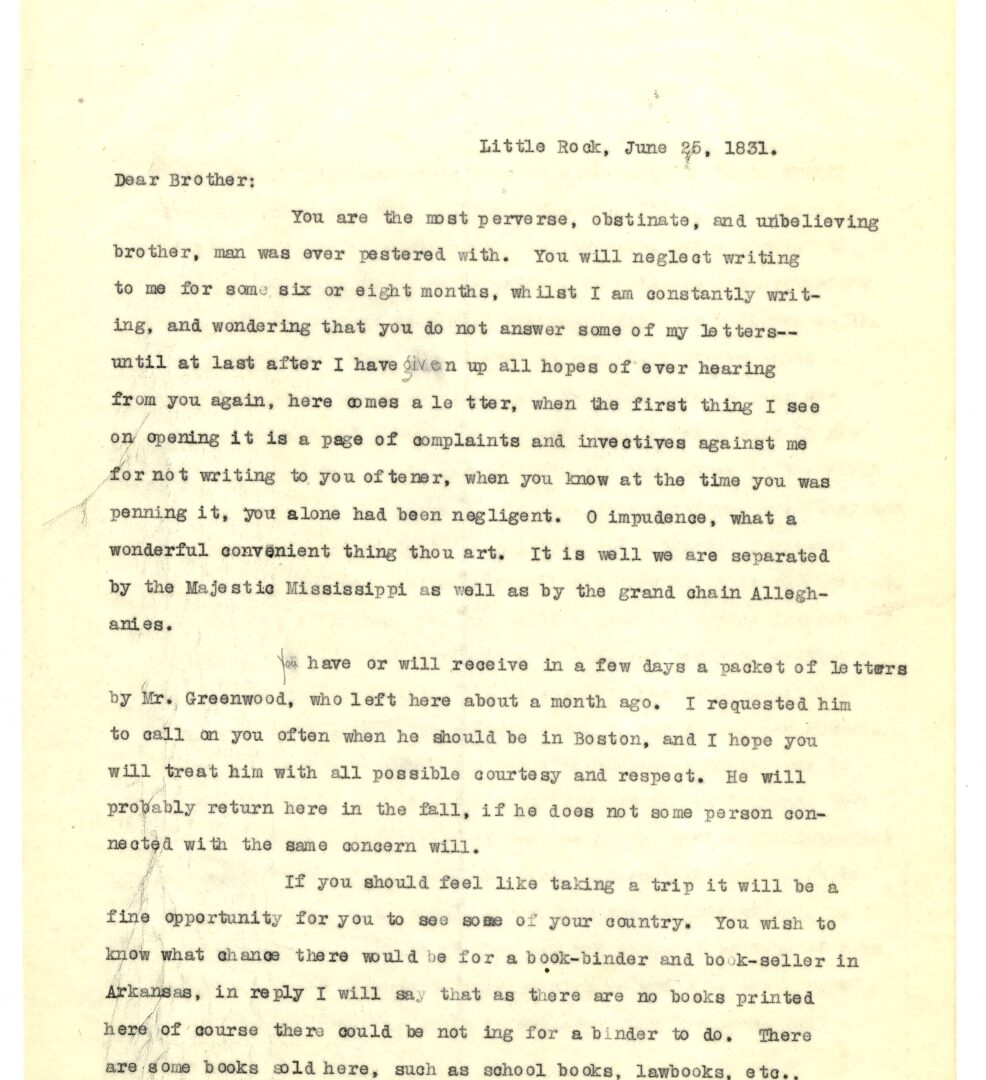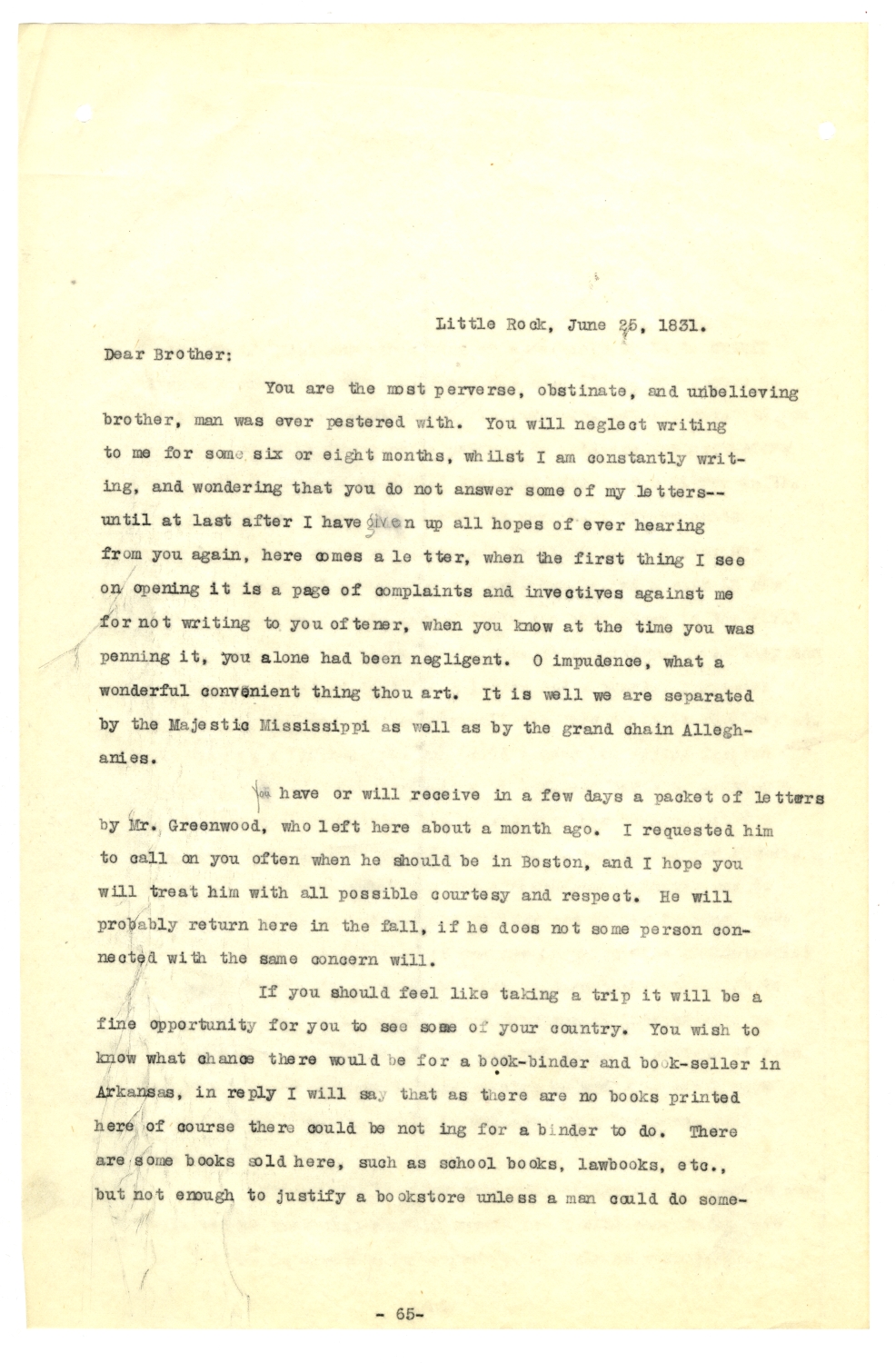Little Rock, June 25, 1831
Introduction
Hiram Abiff Whittington’s letters, which he wrote to his brother Granville Whittington in the late 1820s and early 1830s, remain one of the most valuable personal accounts of daily life in Arkansas shortly before Arkansas Territory became a state. Whittington was one of many entrepreneurial men who moved to Arkansas seeking exciting opportunities and new life in what was at the time the frontier of the United States. He was born in 1805 in Boston, Massachusetts, and moved to Little Rock in 1826. He was a skilled printer and book binder and had experience in book trade and publishing. In Little Rock, he worked as a printer with the Arkansas Gazette but in 1832 he moved to Hot Springs. He settled there hoping that the spring waters would have a healing effect on his deteriorating health. He opened several businesses, created first lending library in Arkansas, and established a successful political career, eventually serving as a state representative. In 1836, Whittington returned to Boston to marry Mary Burnham. The two moved back to Hot Springs and had six children. Whittington died in 1890 in Hot Springs.
Whittington’s letters provide an account into the daily life in Arkansas Territory from a perspective of a white middle class educated man. Access to Whittington’s original letters, which are housed at the Special Collections Department of the University of Arkansas in Fayetteville, is limited due to the documents’ fragility. To make these rare and extremely valuable records more accessible to researchers, educators, and students, Whittington’s letters were typed. Activities in “Arkansas Before Statehood” are based on six typescript letters (typed copies of the original letters) selected from a collection of sixteen letters housed at the Center for Arkansas History and Culture in Little Rock (Hiram A. Whittington Papers, 1824-1834, UALR.MS.0157).
Note for educators: Each letter and thus each exercise in “Arkansas Before Statehood” can be used as a separate complete activity to enrich a discussion on Arkansas history shortly before statehood. However, each letter highlights different aspects of life in Arkansas Territory so any number and combination of letters and corresponding exercises can form a set. All the six letters showcased in “Arkansas Before Statehood” and thus all the corresponding exercises can be also used as a set to create a more comprehensive and complex historical picture. The latter may work particularly efficiently if you divide your students into groups and assign one letter to each group.
Activity Questions
Hiram Abiff Whittington letter to Granville Whittington, page 65
Hiram Abiff Whittington letters to Granville Whittington includes discussions of his brother taking a trip, the cost of living in Arkansas Territory, possibilities of his brother getting into the book-binding business, sickness and death in Little Rock, and his brother's marriage. Hiram A. Whittington Papers, 1824-1834 (UALR.MS.0157)
- What do we learn about communication between Arkansas Territory and other parts of the United States from this letter? Why do you think Whittington complains that his brother does not write him frequently enough? Could Whittington call or email his brother when the brother did not write him a letter?
- What kind of professions are needed in Arkansas according to Whittington? What does it tell us about the economy and development of Arkansas at the time?
- What do we learn about farming in Arkansas from Whittington?
- Why is Whittington unwilling to get married? What do his concerns and doubts tell us about middle class marriage in the 19th century?
- What is Whittington’s opinion about women in Arkansas? Do you think that all women in Arkansas were able to live the lifestyle that he describes? How could Whittington’s point of view (he was a white middle class educated man) influence his perception of women in Arkansas?
- Although Whittington wrote many letters to his brother, he does not mention slavery very often. But he does mention it briefly in this letter. What do we learn about slavery in Arkansas Territory from this letter?
- Write down what you learned about life in Arkansas Territory from this letter. Include information about communication, economy, people, customs, and natural environment.
Additional Questions
These can be applied to any letter or any set of letters used in the Arkansas Before Statehood theme.
- What can we learn about life in Arkansas Territory from Whittington’s letter/letters?
- How did Whittington’s social status and his own experience shape his perception of Arkansas? Whittington was a white middle class educated man from Boston, which was at the time one of the largest cities in the United States.
- How did Whittington’s social status and his own experience shape his life in Arkansas? Did the people who were not white, educated, middle class, or men have the same life in Arkansas in the 1820s and 1830s as Whittington?
- How did Whittington’s social status and his own experience shape his perception of people in Arkansas who were not like him (e.g., women, Native Americans, enslaved African Americans, uneducated poor workers)?
Primary Sources
To learn more about the primary sources featured in the activities above, click the following links:
Arkansas Social Studies Standards
US History, Grade 8
- Strand: Era 4: Expansion and Reform 1801-1861
- Content Standard 1: Students will analyze the period of expansion and reform in the United States.
- Era4.1.8.1 Analyze multiple factors that affected territorial expansion and influenced the perspectives of people
- Era4.1.8.3 Examine economic, political, and geographic causes and effects of territorial expansion
- Era4.1.8.6 Evaluate the historical significance of individuals, groups, and events
Arkansas History, Grades 7 – 8
- Strand: History
- Content Standard 7: Students will examine the impact of historical events and people on the development of Arkansas.
- H.7.AH.7-8.1 Evaluate ways that historical events in Arkansas were shaped by circumstances in time and place
Arkansas History, Grades 9 – 12
- Strand: Era 2: Louisiana Purchase Through Early Statehood 1803-1860
- Content Standard 2: Students will analyze causes and consequences of events from the Louisiana Purchase through early statehood.
- Era2.2.AH.9-12.1 Evaluate intended and unintended consequences of public policies (e.g., Louisiana Purchase, Missouri Compromise, Indian Removal)
- Era2.2.AH.9-12.4 Evaluate effects of human-made and natural disasters on Arkansas (e.g., earthquakes, flooding, disease)
- Era2.2.AH.9-12.5 Evaluate reasons for and impact of human settlement on various regions (e.g., land grants, labor force, railroad, political unrest)
Key Terms
More Information
- https://encyclopediaofarkansas.net/entries/hiram-abiff-whittington-1172/
- https://encyclopediaofarkansas.net/entries/louisiana-purchase-through-early-statehood-1803-through-1860-398/
- https://www.historicarkansas.org/Collections-and-Research/arkansas-history-timeline-1819-1861
- https://www.digitalhistory.uh.edu/active_learning/explorations/indian_removal/removal_timeline.cfm
Downloadable Guides and Handouts
We encourage K-12 educators to use History Alive: Virtually! in a way that will best match their classroom needs. The “Exercise” handout includes a complete exercise as featured on this website, the “Primary Sources” handout includes only primary sources used in the exercise, and the “Questions” handout includes analytical questions from the exercise but is editable and can be easily changed to best match students’ needs.
Little Rock, June 25, 1831 – Exercises


